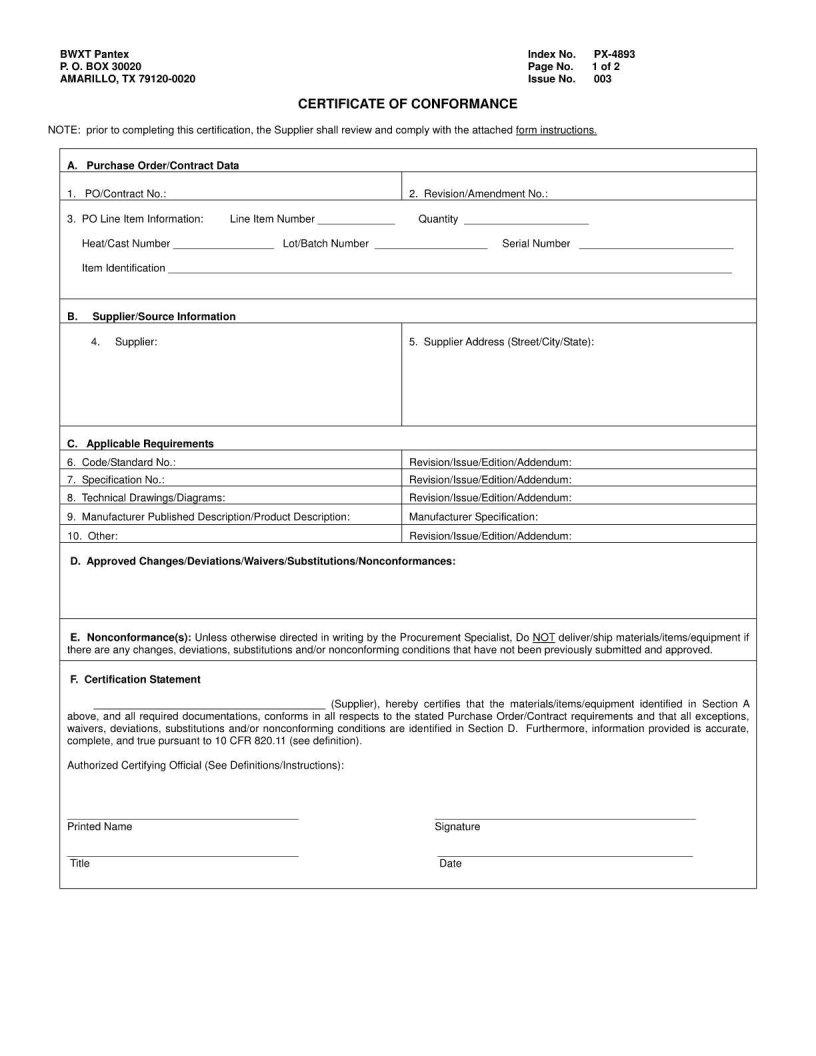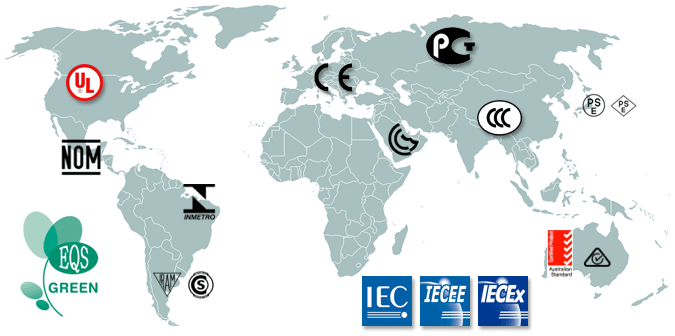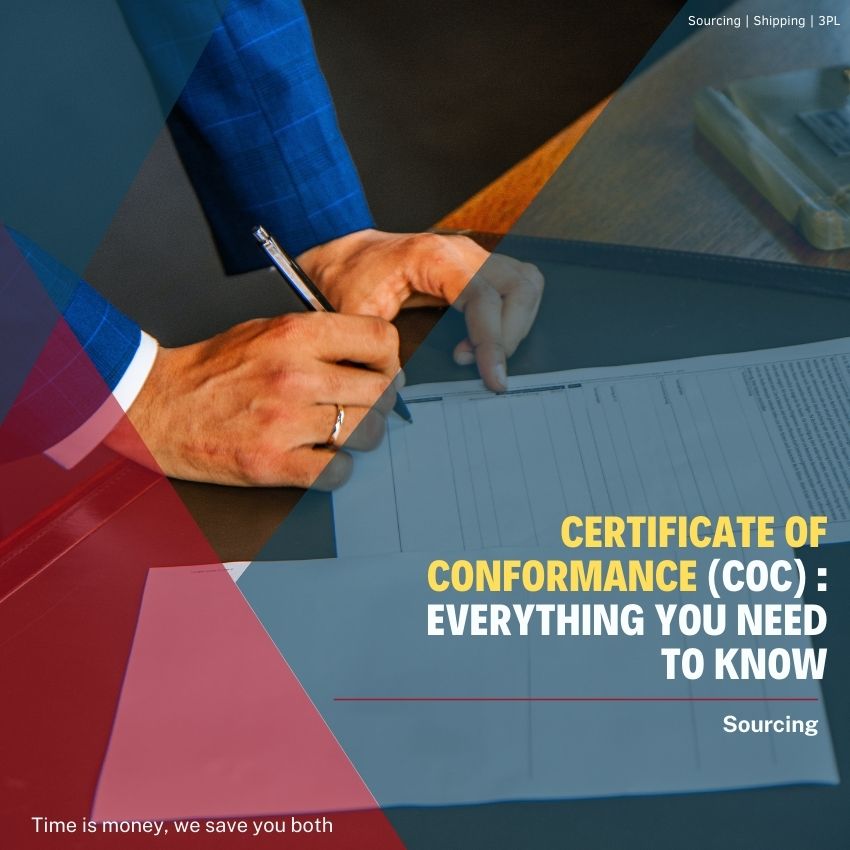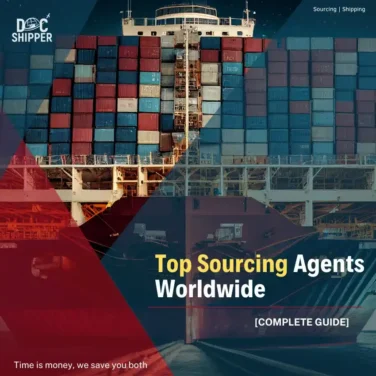Welcome to the Comprehensive Guide on Certificate of Conformance (CoC): Unlocking the Key to Compliance and Quality Assurance
In the world of standards and regulations, ensuring conformity and quality is paramount. When it comes to demonstrating compliance with established requirements, the Certificate of Conformance (CoC) takes center stage. This powerful document serves as a testament to a product’s adherence to specific standards and regulations, instilling trust and confidence in both businesses and consumers.If you’ve ever found yourself pondering the intricacies of CoCs or wondered about their significance in various industries, you’ve come to the right place. This article serves as your ultimate resource, encompassing everything you need to know about Certificates of Conformance.
Let us guide you through the intricacies, complexities, and benefits of this essential document, empowering you with the knowledge to navigate the realm of compliance and quality assurance with confidence and precision.
Introduction to Certificate of Conformance
The Certificate of Conformance (CoC) is a crucial document that verifies compliance with standards and regulations. In this section, we will explore the basics of the CoC, including its definition, purpose, and significance in various industries. Understanding the fundamentals of the CoC is essential for businesses aiming to demonstrate their commitment to quality and regulatory compliance.
What is a Certificate of Conformance?
A Certificate of Conformance (CoC) is an official document issued by a manufacturer, supplier, or authorized entity that declares a product’s compliance with specific standards, specifications, or regulatory requirements. It serves as tangible evidence that the product meets the prescribed criteria and has undergone the necessary testing, inspections, or quality control procedures.
Importance of Certificate of Conformance 
The Certificate of Conformance holds immense importance for both businesses and consumers. Here are a few key reasons why CoCs play a crucial role :
Ensuring Compliance :
- CoCs provide assurance that a product meets the necessary legal, industry, or regulatory requirements.
- They help businesses demonstrate their commitment to quality and adherence to established standards.
Quality Assurance :
- CoCs serve as an assurance to the quality and reliability of a product.
- They give consumers confidence that the item they are purchasing has undergone rigorous testing and meets the specified standards.
Facilitating Trade :
- In international trade, CoCs are often required to ensure conformity with import/export regulations.
- They help streamline the customs clearance process and enable smoother transactions between different countries or regions.
Liability Protection :
- CoCs can provide legal protection for manufacturers or suppliers by documenting their efforts to meet applicable standards.
- In case of any disputes or product-related issues, having a CoC can serve as evidence of compliance and mitigate potential liabilities.
Supply Chain Management :
- CoCs play a crucial role in supply chain management, especially in industries with complex networks.
- They help track and verify the compliance of products throughout the distribution process, ensuring transparency and accountability.
DocShipper Alert
DocShipper Alert : Struggling with the complexities of obtaining a Certificate of Conformance (CoC) for your products? DocShipper is here to help. As a specialized logistics provider, we understand the challenges you face with regulatory requirements, documentation, and administrative tasks. Our experienced team can guide you through the entire process, from document collection to CoC acquisition. Contact us !
When and why do we need a Certificate of Conformance ?
Knowing when and why a Certificate of Conformance (CoC) is required is essential for businesses. In this section, we will discuss the circumstances that necessitate a CoC, such as legal requirements, industry standards, and customer expectations. Understanding the reasons behind the need for a CoC helps companies ensure compliance, meet market demands, and enhance their reputation for delivering high-quality products and services.
Country-specific requirements for Certificates of Conformance

Different countries have specific regulations and requirements regarding the use of Certificates of Conformance. These requirements may vary depending on the industries, products, and standards involved, and can extend to customs procedures as well. Customs authorities in various countries may request a Certificate of Conformance as part of the import or export documentation process. This highlights the importance of obtaining and providing CoCs to ensure smooth customs clearance and compliance with import/export regulations. Businesses engaging in international trade should be aware of these customs requirements and include the necessary CoCs in their documentation to facilitate trade and avoid potential delays or penalties.
Here are some examples of specific regulations that certain countries, such as China, France, and the United States, may require in terms of Certificates of Conformance:
China :
- China Compulsory Certification (CCC) for certain electronic products, automobiles, toys, etc.
- GB (Guobiao) standards for product compliance with Chinese standards.
France :
- CE (Conformité Européenne) certifications for various products intended to be marketed within the European Union.
- Specific regulations for industries such as food, pharmaceuticals, and medical devices.
United States :
- UL (Underwriters Laboratories) certifications for electrical and electronic products.
- FDA (Food and Drug Administration) regulations for food, medical, and pharmaceutical products.

These examples highlight some of the specific regulations and certifications that these countries may require. However, it’s important to note that the list of regulations is much broader and varies across sectors and products. It is essential to refer to the current regulations in each country and specific industry to ensure compliance and obtain the appropriate certification.
Sectors and industries that require Certificates of Conformance
Certificates of Conformance are crucial in various sectors and industries where compliance with specific standards is of utmost importance. Some of the sectors that commonly require CoCs include :
Manufacturing and Engineering : Industries involved in the production of machinery, equipment, and components often require CoCs to demonstrate compliance with safety, performance, and quality standards.
Construction and Infrastructure : Construction projects, infrastructure development, and building materials often necessitate CoCs to ensure compliance with building codes, structural integrity, and safety regulations.
Electronics and Electrical Appliances : The electronics industry, including consumer electronics, electrical appliances, and IT equipment, often requires CoCs to ensure compliance with electromagnetic compatibility (EMC), safety, and environmental regulations.
Automotive and Transportation : The automotive industry requires CoCs for components, parts, and vehicles to demonstrate compliance with safety, emissions, and performance standards.
Medical Devices and Pharmaceuticals : The healthcare sector relies on CoCs to ensure the safety, effectiveness, and quality of medical devices, equipment, and pharmaceutical products.
Food and Beverage : In the food and beverage industry, CoCs are essential to guarantee product safety, quality, and compliance with food hygiene and labeling regulations.
These are just a few examples of sectors and industries where Certificates of Conformance hold significant importance. However, it’s important to note that specific requirements may vary within each sector and across different regions. Understanding the industry-specific needs and standards is crucial for obtaining the necessary CoCs and ensuring compliance within your respective field.
DocShipper Info
DocShipper info : Dealing with the complexities of obtaining Certificates of Conformance can be overwhelming and time-consuming for businesses. Ensuring compliance with country-specific regulations, navigating industry standards, and managing documentation can be a challenging task. DocShipper offers a seamless solution to simplify the process of obtaining Certificates of Conformance. Contact us !
Preparation and Obtaining a Certificate of Conformance
Preparing and obtaining a Certificate of Conformance (CoC) involves various steps. In this section, we will explore the responsibilities of manufacturers, suppliers, and authorized representatives in ensuring compliance. We will also highlight the key stages of preparing a CoC, from identifying requirements to gathering supporting documentation. Understanding the preparation process is crucial for businesses aiming to demonstrate their commitment to quality and regulatory compliance.
Who is Responsible for Preparing the Certificate of Conformance?
The responsibility for preparing a Certificate of Conformance (CoC) typically falls on the manufacturer, supplier, or authorized representative of the product or service. They are accountable for ensuring compliance with the required standards and regulations. However, companies may choose to engage the services of third-party logistics providers or freight forwarders, such as Docshipper, to simplify the process and ensure compliance. These experts specialize in handling the necessary documentation and can streamline the certification procedures, making the CoC preparation more efficient for businesses.
Process of Preparing a Certificate of Conformance

The process of preparing a Certificate of Conformance involves several key steps :
- Identify the Applicable Standards and Regulations: Research and determine the specific standards and regulations that apply to the product or service.
- Collect Supporting Documentation: Gather relevant documentation and evidence that demonstrate compliance with the identified standards.
- Review and Verification: Conduct a thorough review and verification of the collected documentation to ensure compliance.
- Compilation of Information: Compile all necessary information, including product details, standard references, and test results.
- Document Formatting and Design: Format and design the Certificate of Conformance in a clear and professional manner, including relevant details and company information.
- Sign and Issue the Certificate: Have an authorized representative sign the Certificate of Conformance and issue it to the appropriate parties, such as customers or regulatory authorities.
Content and requirements of a Certificate of Conformance
A Certificate of Conformance (CoC) is a vital document that verifies that a product or service meets specified standards and regulations. It contains key information regarding compliance and fulfills certain requirements to ensure the quality and safety of the product or service. In this section, we will explore the content and general requirements of a Certificate of Conformance.
Essential Information to Include in a Certificate of Conformance
Product Information : Provide comprehensive details about the product or service, including its name, model number, description, and relevant specifications. This information helps to accurately identify the specific item being certified.
Standards and Regulations : Clearly state the specific standards, regulations, or requirements that the product or service conforms to. This demonstrates adherence to industry-recognized benchmarks and ensures compliance with relevant guidelines.
Test Results : Include test results or certifications obtained from accredited laboratories or testing facilities. These results provide objective evidence of the product’s compliance with the required standards.
Manufacturing or Service Details : Provide information about the manufacturer, supplier, or service provider. Include the company’s name, address, and contact information. This allows stakeholders to easily identify the responsible entity and establish communication if necessary.
Authorized Representative : Clearly identify the authorized representative who has signed and issued the Certificate of Conformance. This person should have the authority and knowledge to validate the product’s compliance and ensure the accuracy of the certificate.
Date of Issuance : Clearly indicate the date on which the CoC was issued. This helps establish the currency and validity of the certificate and enables stakeholders to track its issuance timeline.
DocShipper Info
DocShipper info : Businesses face significant challenges when it comes to creating and managing Certificates of Conformance. Understanding specific requirements, collecting relevant documents, and coordinating with stakeholders can be confusing and complicated. DocShipper provides a turnkey solution to facilitate the obtaining and management of Certificates of Conformance. Our experienced team specializes in compliance with standards and regulations, and we handle all steps of the process. Fill our online form and get your FREE sourcing quote now
Essential information to include in a Certificate of Conformity
To support the claims of conformity and ensure the validity of the Certificate of Conformance, several key documents may be required. These documents play a crucial role in demonstrating compliance with relevant standards and regulations. Some of the essential documentation includes :

Product Specifications : This includes detailed specifications, technical drawings, and descriptions of the product or service. It provides a clear understanding of its features, functionalities, and intended use.
Test Reports : Certified test reports from accredited laboratories or testing facilities are essential. These reports showcase the results of tests conducted to verify compliance with specific standards and regulations. They provide objective evidence of the product’s performance and safety.
Inspection Certificates : Issued by authorized inspection agencies or experts, these certificates validate compliance with specific requirements. They attest that the product or service has undergone a thorough inspection process and meets the necessary criteria.
Quality Control Records : Documentation of the implemented quality control processes during manufacturing or service provision is crucial. These records outline the steps taken to ensure consistent quality, adherence to specifications, and compliance with applicable standards.
Compliance Declarations : These declarations or statements affirm that the product or service complies with the relevant standards and regulations. They serve as formal acknowledgment of the commitment to meet the specified requirements.
Supporting Documentation : Additional documentation may be required based on industry-specific guidelines and country-specific regulations. This can include certifications, permits, licenses, or any other relevant documents.
By including these essential documents in the Certificate of Conformance, businesses can provide a comprehensive and robust demonstration of their compliance with the required standards and regulations.
What’s the Difference Between a Certificate of Conformity and a Certificate of Conformance?

A Certificate of Conformity (CoC) and a Certificate of Conformance (CoC) are both documents that demonstrate adherence to certain standards or regulations, but there are differences in their meanings and applications.
A Certificate of Conformity typically refers to a document issued by a regulatory authority or certification body. It signifies that a product, process, or system meets specific legal or regulatory requirements. The focus of a CoC is on verifying compliance with external standards set by authorities or industry regulations. It often involves rigorous testing, inspection, and evaluation processes conducted by authorized entities.
On the other hand, a Certificate of Conformance is generally issued by the manufacturer, supplier, or authorized representative of a product or service. It asserts that the item or service has been produced or performed in accordance with specified standards or requirements. The emphasis of a CoC is on demonstrating conformity to internal or customer-specific standards, guidelines, or contractual obligations.
The main difference between a Certificate of Conformity and a Certificate of Conformance lies in the entity issuing the document and the standards to which they refer. A CoC is typically issued by a regulatory authority to verify compliance with external regulations, while a CoC is issued by the manufacturer or supplier to assert compliance with internal or customer-specific requirements. Both certificates play important roles in ensuring quality, safety, and regulatory compliance in various industries.
DocShipper Tip
DocShipper Advice : By conducting thorough research, you can ensure you obtain the appropriate certification for your products or services. This not only demonstrates compliance with standards and regulations but also enhances your reputation and meets the expectations of stakeholders. DocShipper can help you import test the compliance of your products with the regulatory requirements Contact us today !
FAQ | Certificate of Conformance (CoC) : Everything you need to Know
Read more
Looking for more? These articles might interest you:
DocShipper info: Do you like our article today ? For your business interest, you may like the following useful articles :
Need Help with
Logistics or Sourcing ?
First, we secure the right products from the right suppliers at the right price by managing the sourcing process from start to finish. Then, we simplify your shipping experience - from pickup to final delivery - ensuring any product, anywhere, is delivered at highly competitive prices.










